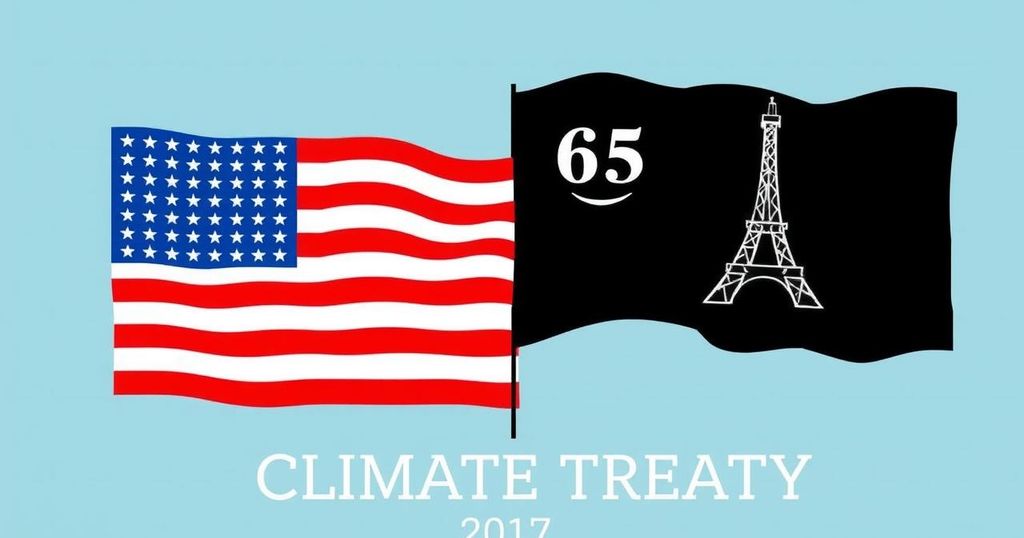President-elect Donald Trump has indicated a desire to withdraw from the Paris Climate Agreement, suggesting a second exit could occur more swiftly than the first. Experts warn of potential global trust issues and encourage consideration of broader implications for U.S. international relations and climate policy. The ongoing discourse emphasizes the importance of U.S. involvement in addressing climate change on a global scale.
As President-elect Donald Trump has indicated intentions to withdraw from the Paris Climate Agreement, a prospective second withdrawal may significantly differ from the initial one. The Paris Agreement, created during the U.N. Climate Change Conference in 2015, binds nearly 195 countries to collaborative commitments on climate action. The United States formally joined the accord under former President Barack Obama in 2016 but faced a legally mandated waiting period of three years before initiating withdrawal, which concluded at the end of 2020.
President Biden reinstated U.S. participation in the accord shortly after assuming office in 2021. However, Trump, ahead of the upcoming presidential election, suggested to Politico his willingness to exit the treaty again, which could facilitate a quicker departure compared to the previous administration’s timeline.
Experts predict that the implications of a second U.S. exit could be considerable. David Waskow, from the World Resources Institute, noted, “It would be a very different timeline now.” Concurrently, Max Boykoff, a professor at CU Boulder, expressed concern that such a withdrawal could erode global trust and possibly prompt other nations to contemplate similar exits, with Argentina’s President Javier Milei recently signaling his consideration of withdrawal. Boykoff articulated, “The withdrawal may also cause other leaders, who have also expressed resistance to addressing climate policy as a priority in their own countries, to leave the agreement.”
Supporters of Trump’s potential withdrawal assert that exiting the agreement would reclaim U.S. sovereignty and alleviate what they view as unnecessary emission restrictions placing U.S. competitiveness at a disadvantage with countries like China. H. Sterling Burnett from the Heartland Institute stated, “The benefits of exiting the Paris climate agreement are many, first and foremost reclaiming U.S. sovereignty while respecting the rule of law.” Furthermore, he suggested that future rejoining efforts could face challenges if Trump were to require Senate approval for any renewed commitment to the treaty.
Simultaneously, discussions regarding abrogating the U.N. Framework Convention on Climate Change are surfacing. Mandy Gunasekara, former Chief of Staff at the EPA, proposed that the next administration should consider withdrawing from both treaties to counteract international agreements seen as detrimental to U.S. economic interests.
Overall, the commitment of the United States to the Paris Agreement remains vital, as articulated by U.N. Secretary-General António Guterres: “The Paris Agreement can survive, but people sometimes can lose important organs or lose the legs and survive. But we don’t want a crippled Paris agreement. We want a real Paris agreement.”
Thus, the future of U.S. involvement in climate treaties hinges on the outcomes of current and forthcoming administrations, potentially influencing both domestic policies and international collaborative efforts on climate change.
The Paris Climate Agreement was formed at the 2015 U.N. Climate Change Conference and serves as a legally binding treaty among nearly 195 countries. The accord aims to spur global cooperation to combat climate change by requiring member nations to commit to specific climate action plans. The United States’ previous withdrawal under Trump and subsequent reinstatement under Biden highlighted the political dichotomy in U.S. climate policy and demonstrated how changes in administration can affect international agreements crucial for environmental governance.
In summary, Donald Trump’s potential second withdrawal from the Paris Climate Agreement could differ markedly from the first, with implications that may reshape international climate cooperation and trust. Experts express concerns over the potential cascading effects this exit could have on other nations. Furthermore, the discussion around U.S. sovereignty and economic competitiveness continues to drive the dialogue concerning international climate commitments, revealing deep divisions over environmental policy directions in the U.S. Furthermore, the overarching belief remains that U.S. participation is pivotal for the success and credibility of the Paris Agreement.
Original Source: www.foxnews.com






